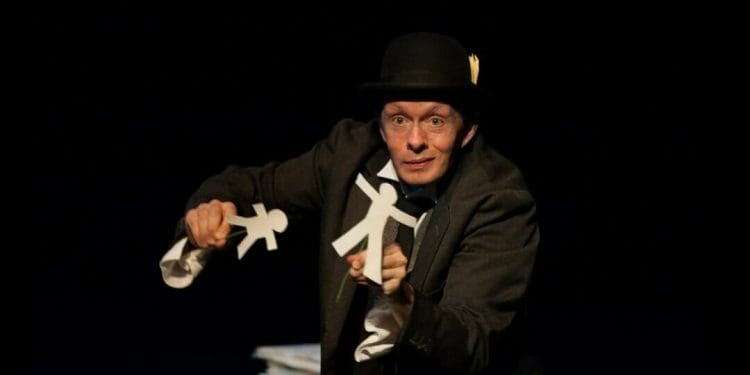Patrick is co-Artistic Director of Menagerie, producers of ‘bloominauschwitz’. He, together with director Rachel Aspinwall, has been at the heart of this project since its inception 4 years ago. With Menagerie, he has performed in or directed dozens of new plays, working with writers such as Steve Waters, Naomi Wallace, Fraser Grace, Claire MacDonald, Hisham Matar and Craig Baxter. He runs Menagerie’s Young Writers Workshops and directs The Ideas Stage, an ongoing collaboration with universities to explore ways of theatricalising research. This autumn, he’ll be directing the touring forum theatre piece, ‘The Great Austerity Debate’.
bloominauschwitz is coming to The Just Festival, what can you tell us about it?
bloominauschwitz is an exuberant new play about identity, belonging, migration and whether we should remember or forget. It centres on Leopold Bloom, the central character of James Joyce’s novel, ‘Ulysses’, set on June 16th 1904. Bloom escapes from the book to go in search of his true Jewish identity, in the company of his chief antagonist: a future Bloom from 2018, and a very different character. It is a time-travelling odyssey which transports Bloom through the 20th century, discovering just what that identity means, and whether he truly wants to choose it. The play has a life force which counteracts the destructive powers that he encounters. It is a celebration of the art of storytelling: an elegy to those lost to grief & conflict and an expression of our unique human ability to continually imagine new futures.
What’s the one thing about bloominauschwitz that makes it different from all the rest?
Well let’s start with the title. It’s shocking, particularly if you say it out loud in a public place. Yet that title hides much more than it reveals, which is what makes the piece so fascinating. The best way of describing it is as a theatrical feast – the play taps in to narratives, emotions and experiences we can all understand: the fundamental need to connect with a personal and collective history; the pull and push of parent-child dynamics; and the basic desire to be loved & wanted. It borrows liberally from different theatrical styles – there’s comedy, high drama, horror, vaudeville, audience participation, just to name a few. It uses these conventions to tell a fascinating and unpredictable story which resonates strongly with ongoing political and social upheavals in our contemporary world. The piece is so rich, so full of hidden depths, that even after working on its development for 4 years, we’re still making new discoveries. That says a lot about the quality of Richard’s writing and about the themes & questions it explores.
Have you had to make any changes to the production to suit the space you have in your venue?
Yes we’ve had to make the set smaller! Which is perfect actually, for the story of a man who is trapped within his novel. The set was in landscape format before, and now it’s in portrait – it sounds a small change, but it means we have had to re-think much of the staging and choreography, which is no bad thing. It keeps Rachel and I fresh in our thinking, and – as the date gets nearer – we’re looking forward to placing the set within the Just Festival’s venue and getting on with performing it.
Tell us about the character you play?
The main character I play is Leopold Bloom. He is also split into two different versions of himself, each of whom portray different characteristics and intentions. One is driven by his appetites – he’s a clownish figure who feels every single emotion completely, without censoring them. The other is a more aware, cynical character who is on a completely different trajectory. We’re really exploring the story of one man, in conflict with himself, as he searches through time and across the countries of Europe in an attempt to understand exactly who he is. Oh, and I also play 16 other characters, including the terrifying ghost of Bloom’s dead father and a make-believe prophet.
What’s the most challenging thing about performing in bloominauschwitz?
Playing 18 different characters, with at least 2 in dialogue with each other at any one time. So inhabiting each character convincingly and keeping different storylines alive, along with the practical hurdles that the piece offers me, are a few of the challenges within the performance. It also acknowledges the audience right from the get-go, so it’s important to constantly be connected to them. More than anything, it’s the sheer energy required to tell Bloom’s full story that is particularly daunting, but simultaneously invigorating! bloominauschwitz is a true odyssey – Bloom experiences the best and the worst of what humanity can throw at him and I have to communicate that story to the audience to match & serve the entertaining, playful and sensitive way that it has been written. Performing the piece is akin to keeping ten plates spinning without any crashing to the ground.
Why should people come see bloominauschwitz?
Because it is theatre at its best: joyous, life-affirming and open-hearted in the face of destruction, narrow nationalism and fear. It is engaging particularly because it encompasses so much of the human experience. Bloom embodies both the negative and positive forces which we are witness to in today’s world. And this is why we have made it a one-person show: to see the contradictions of the contemporary age burst forth from one body. It is what makes the show alive, unpredictable and thrilling to watch.
People will also be amazed by the sheer cumulative power of the story, and I defy anyone to be able to adequately articulate their reaction after watching it. It respects its audience’s intelligence and humanity, and doesn’t leave them hanging out to dry – but neither does it spare them the full gamut of emotions that anyone should rightfully expect from a piece of live theatre.
bloominauschwitz is at st Festival @ St John’s (Venue 127) 3rd – 25th August (not 5, 12, 16, 19)















